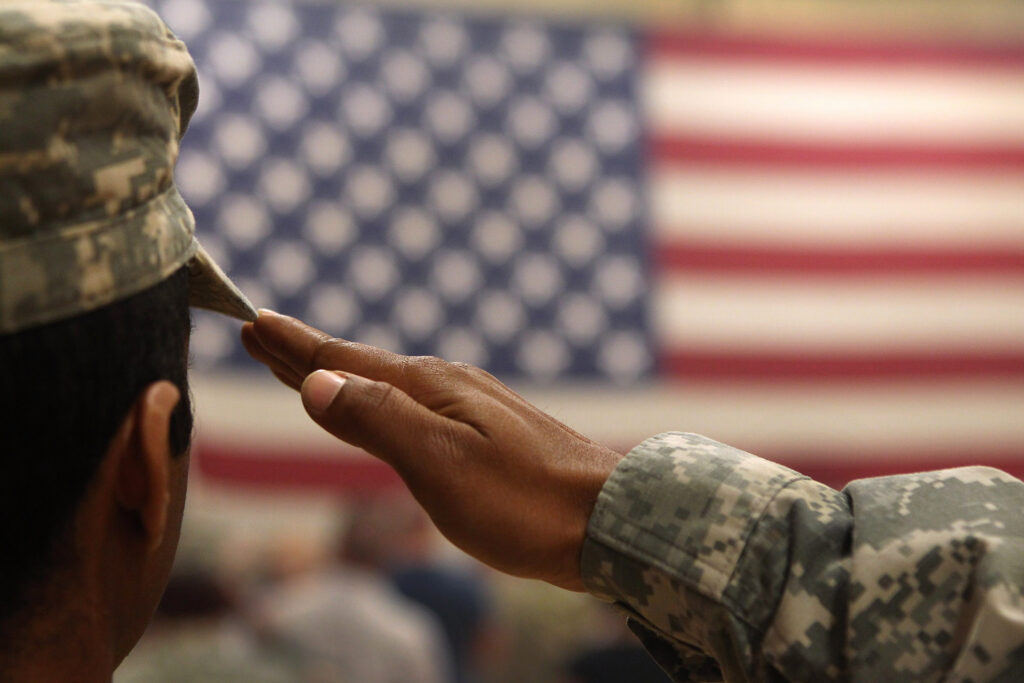Military families are working to solve the “greatest challenge”—preventing veteran suicide—to commemorate Memorial Day this year.
An average of 17 veterans died from suicide each day in 2020, according to a 2022 report from the Department of Veterans Affairs (VA). While this number has dropped in recent years, advocates say more work needs to be done to properly address mental health among veterans, whose experience overseas can cause lifelong challenges.
Studies have shown that up to 23 percent of veterans experience Post Traumatic Stress Disorder at some point in their life, according to the VA.
Blue Star Families’ Combat the Silence campaign is one program that aims to raise awareness about veterans’ mental health to prevent suicide in the military community, campaign lead Kali Hoffman told Newsweek.
“As we approach Memorial Day, it is very important that we think about our veterans at this time. It is a time that we think of those we have lost in battle. But it is also a time when we need to think about those military families and those veterans and servicemembers who have witnessed tragedy overseas and in combat,” Hoffman told Newsweek in a phone interview.
A U.S. soldier salutes the American flag in Fort Carson, Colorado, on June 15, 2011. The Combat the Silence campaign is aiming to raise awareness about mental health among veterans to combat suicide.
John Moore/Getty Images
Hoffman outlined the most significant challenge to preventing suicide among veterans.
“The greatest challenge, which I feel will be a reoccurring thing, is a stigma and the pride factor that keeps our warriors, our greatest warriors, from saying that they’re feeling less that confident and less than human because they’re afraid of the response that they’ll get,” she said.
Creating “safe spaces” and “safe practices” to allow veterans to feel more comfortable discussing mental health is key to solving this issue, said Hoffman.
New awareness about mental health across society at large benefits military families, allowing them to “slowly but surely” reduce the stigma to discuss mental health, she said.
Combat the Silence is working to open dialogue about veteran suicide by unveiling a new PSA on Memorial Day raising awareness about the issue that encourages veterans who may be struggling with their mental health to reach out for help.
“They give people who may not be parts of the military community a look into what PTSD looks and feels like. But it also gives caregivers perspective about how important their role is, as well,” she said.
The campaign is also “training military families and peers and supporters and veterans about how to recognize the signs of a suicidal crisis or a mental health crisis and how to safely intervene,” Hoffman said.
The PSA is intended to encourage registration to the Blue Star Support Circles and is funded through a $50 million grant from the VA. Hoffman said these grassroots projects are crucial to continue efforts to address veteran suicide and other issues important to military families. Programs to help veterans more easily understand the resources available to them are also key to solving this issue, she said.
“These grassroots initiatives in which we put the power in the hands of local, smaller communities to come up with solutions to solve their individual needs to help their individual needs is what that looks like,” Hoffman said.
There are many signs that could indicate a veteran, or anyone, has PTSD, according to the National Institute of Mental Health (NIMH).
Symptoms of PTSD in veterans may include flashbacks, recurring memories or dreams related to trauma, avoiding places or events that remind them of a traumatic experience, becoming easily started, feeling tense or irritable, having difficulty concentrating or sleeping, or engaging in reckless behavior, according to NIMH.
They may also experience cognition and mood symptoms, such as negative thoughts about themselves, difficulty remembering key aspects of the traumatic event, negative emotions and exaggerated feelings of blame toward oneself or others, according to NIMH.
Anybody in an immediate crisis can call or text 988 and press 1 for the Veteran Crisis Line or chat at 988lifeline.org. Hoffman said additional community support is available at www.combatthesilence.org.
Uncommon Knowledge
Newsweek is committed to challenging conventional wisdom and finding connections in the search for common ground.
Newsweek is committed to challenging conventional wisdom and finding connections in the search for common ground.
>>> Read full article>>>
Copyright for syndicated content belongs to the linked Source : Newsweek – https://www.newsweek.com/memorial-day-greatest-challenge-veteran-suicide-combat-silence-1903995
